
John Balliol or John de Balliol, known derisively as Toom Tabard, was King of Scots from 1292 to 1296. Little is known of his early life. After the death of Margaret, Maid of Norway, Scotland entered an interregnum during which several competitors for the Crown of Scotland put forward claims. Balliol was chosen from among them as the new King of Scotland by a group of selected noblemen headed by King Edward I of England.

Sir Henry Percy, nicknamed Hotspur or Harry Hotspur, was an English knight who fought in several campaigns against the Scots in the northern border and against the French during the Hundred Years' War. The nickname "Hotspur" was given to him by the Scots as a tribute to his speed in advance and readiness to attack. The heir to a leading noble family in northern England, Hotspur was one of the earliest and prime movers behind the deposition of King Richard II in favour of Henry Bolingbroke in 1399. He later fell out with the new regime and rebelled, and was slain at the Battle of Shrewsbury in 1403 at the height of his fame.
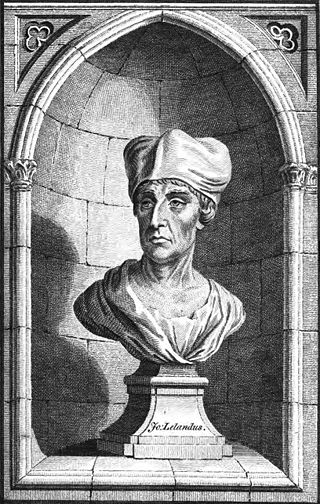
John Leland or Leyland was an English poet and antiquary.

Martin Marprelate was the name used by the anonymous author or authors of the seven Marprelate tracts that circulated illegally in England in the years 1588 and 1589. Their principal focus was an attack on the episcopacy of the Anglican Church.

Thomas Dempster was a Scottish scholar and historian. Born into the aristocracy in Aberdeenshire, which comprises regions of both the Scottish highlands and the Scottish lowlands, he was sent abroad as a youth for his education. The Dempsters were Catholic in an increasingly Protestant country and had a reputation for being quarrelsome. Thomas' brother James, outlawed for an attack on his father, spent some years as a pirate in the northern islands, escaped by volunteering for military service in the Low Countries and was drawn and quartered there for insubordination. Thomas' father lost the family fortune in clan feuding and was beheaded for forgery.
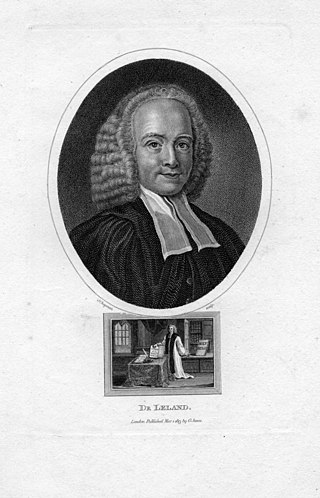
John Leland (1691–1766) was an English Presbyterian minister and author of theological works.
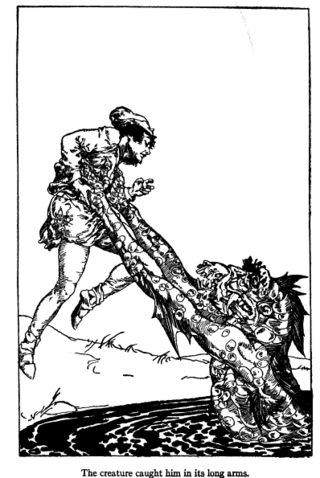
A fuath is a class of malevolent spirits in Scottish Highland folklore, especially water spirits.
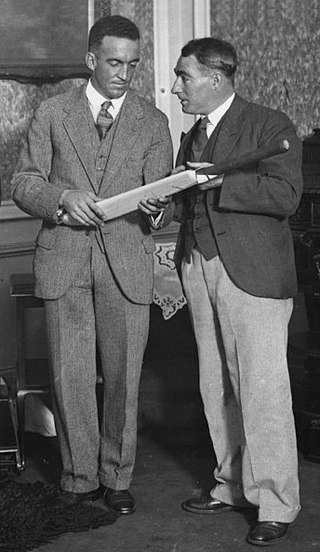
Charles Stewart Dempster was a New Zealand Test cricketer and coach. As well as representing New Zealand, he also played for Wellington, Scotland, Leicestershire and Warwickshire.
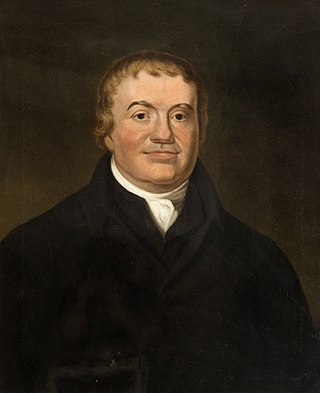
David Dale was a leading Scottish industrialist, merchant and philanthropist during the Scottish Enlightenment period at the end of the 18th century. He was a successful entrepreneur in a number of areas, most notably in the cotton-spinning industry, and was the founder of the cotton mills in New Lanark, where he provided social and educational conditions far in advance of anything available anywhere else in the UK. New Lanark attracted visitors from all over the world. Robert Owen, who married Dale’s daughter, Caroline, in 1799, used New Lanark to develop his theories about communitarian living, education and character formation. Scottish historian, Tom Devine, described Dale as ‘the greatest cotton magnate of his time in Scotland’.
Nigel Richard Patton Dempster was a British journalist. Best known for his celebrity gossip columns in newspapers, his work appeared in the Daily Express and Daily Mail and also in Private Eye magazine. At his death, the editor of the Daily Mail Paul Dacre was reported as saying: "His scoops were the stuff of legend and his zest for life inexhaustible".

±

George Durie, abbot of Dunfermline and archdeacon of St Andrews, son of John Durie of Durie in the county of Fife, and brother to Andrew Durie, bishop of Galloway, was born about 1496. From 1527 till 1530 he acted as judge and executor of the monastery of Arbroath. During this same period he assumed the title of abbot of Dunfermline, and discharged some of the duties of that office under the direction of his uncle, Archbishop James Beaton, the actual titular, on whose death in 1539 he was promoted by James V to the full dignity of the office.
Henry Sinclair (1508–1565) was a Scottish lord-president of the court of session and bishop of Ross.

Psalm 1 is the first psalm of the Book of Psalms, beginning in the English King James Version: "Blessed is the man", and forming "an appropriate prologue" to the whole collection according to Alexander Kirkpatrick. The Book of Psalms is part of the third section of the Hebrew Bible, and a book of the Christian Old Testament. In Latin, this psalm is known as "Beatus vir" or "Beatus vir, qui non abiit".
John Barwick was an English theologian.
William Beckley was an English Carmelite.
Benedict Chelidonius or Schwalbe was an abbot of the Scottish monastery at Vienna. A scholar of Greek and a Neo-Latin poet, he worked with the artist Albrecht Dürer. In some of his publications he took the name Musophilus.
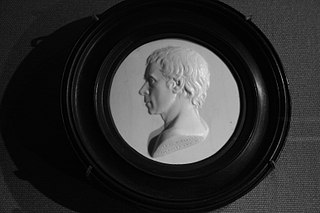
George Willison (1741–1797) was a Scottish portrait-painter. He is best known for his works done in India.
Events from the year 1579 in the Kingdom of Scotland.
John Ireland or Irland, also known as Johannes de Irlandia, was a Scottish theologian and diplomat.












